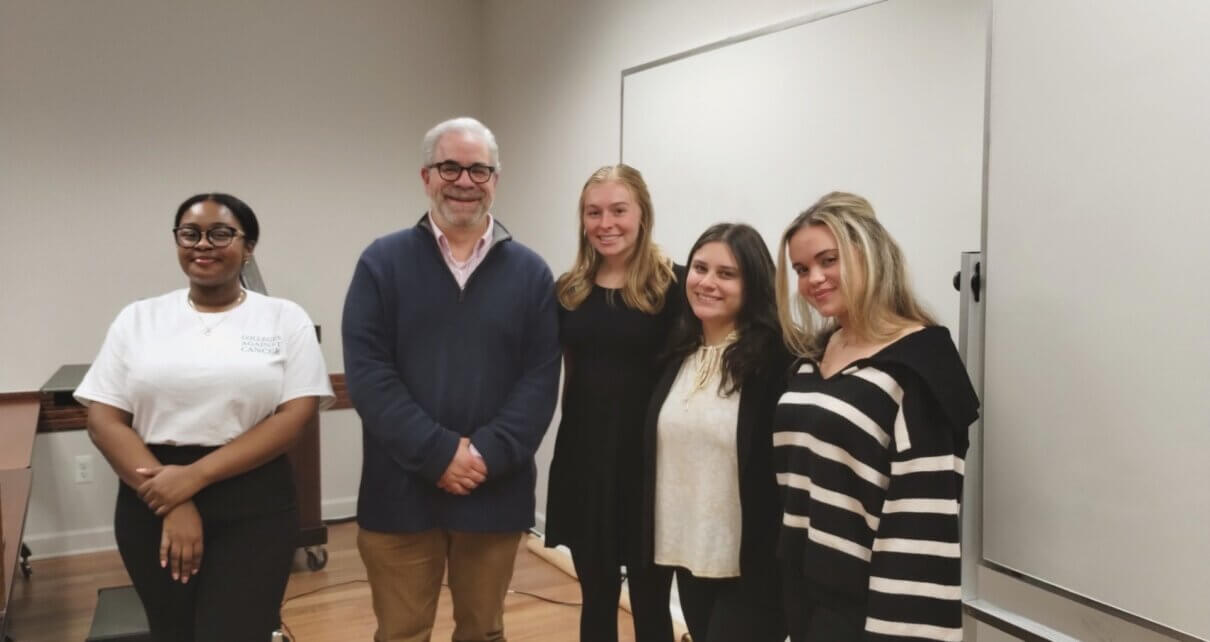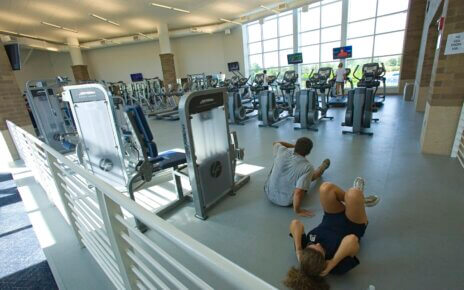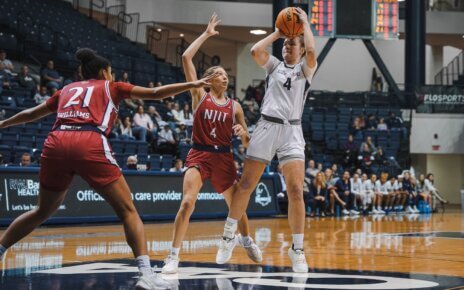The Colleges Against Cancer Club held an event on Tuesday, Dec. 5, 2023, where Jeffrey H. Weisburg, Ph.D., specialist biology professor, discussed various aspects of cancer, such as what it is, how people tend to contract it, and ways to lessen one’s risk.
Chrismaelie Anselme, senior business student and the Colleges Against Cancer Club President, briefly introduced the club, what would be discussed during the event, and introduced the participants of the event including Weisburg and Julia Rice, a junior biology major and vice president of the Colleges Against Cancer Club.
She said, “This event means a lot to us because our club is kind of new. This takes our goal, which is spreading awareness about cancer, into a whole new direction, and we love that Professor Weisburg is on board with it.”
Anselme continued, “I just want to give a little bit of an introduction about what our event will be like today. Julia is going to host, and Professor Weisburg is going to speak.”
Rice then spoke about how she cares about the club and how they have made big strides this year in being involved on campus.
“I love the club and everything we’ve done so far this year; we’ve made giant strides and are doing new activities with the club on campus, one of which is including our speaker today. It is my pleasure to welcome, for the first time, speaking for Colleges Against Cancer, Dr. Weisburg speaking about his research here on campus.”
Weisburg discussed about how, when you are a professor, you care about your students, and you care about your classes, but you forget that there is a life that exists outside the classroom. You sometimes forget that things happen in people’s lives, and when I learned about your club, I didn’t realize or think about how many students have had cancer or had a family member who had cancer.”
He went on to talk about a particular person in his life who has breast cancer, his sister-in-law, whom he loves dearly and attributes his cancer research to.
“This is my special person that I think about when I do my research, that is my sister-in-law, and she has breast cancer. I’ve been touched by cancer very closely as well. I’m very close to her. I love my sister-in-law more than life itself, so I think cancer is a very personal thing as well, and it’s not all scientific,” explained Weisberg.
Weisburg goes into how he became interested in cancer research. He initially wanted to be a physician but fell in love with organic chemistry when attending college in his junior year. After taking some time off from school, he got accepted into Weill Medical College of Cornell University.
“I was always a science person, so when I went to college, I knew I always wanted to do some form of research, so I went to school, and in my junior year, I fell in love with being in a lab, and I went to school thinking I was going to be a physician and then I took a course that changed my life and believe it or not that was organic chemistry. Usually, it strikes fear into the hearts of most students, but I fell in love with it,” Weisburg said.
He continued, “I didn’t know what I wanted to do with my life. I loved the lab, I loved doing research, and I wasn’t an instant gratification person. I didn’t need to know the answer right away and didn’t mind that it took weeks or months to get an answer, so I took two years off and applied to graduate school and somehow, I don’t know how I got into Weill Cornell Graduate School For Medical Sciences.”
“Cancer is the development of an abnormal cell; one of your cells becomes abnormal, and because it becomes abnormal, it starts dividing uncontrollably. For some reason, the mechanism that tells it to stop dividing is no longer in place and starts infiltrating into different parts of your body. Different tissues, different organs, and thats the destructive power of cancer,”elaborated Weisburg. “What causes these genetic changes, that causes these mutations that make a cancer cell become cancerous are several factors. The big one is hereditary; if you have a family member with cancer, and depending on the type of cancer, these things can be passed on to offspring. But there are the factors that are outside, such as radiation, and this is what scares me a lot, and I’m really vocal about this every year I teach the nurses at anatomy and physiology, and we always talk about the skin, and I’m appalled and shocked when I learn how many students go into tanning beds it blows my mind.”
He underscored how tanning beds is one of the most dangerous things you could ever do, and it doesn’t matter that it’s only for a short amount of time.
“It’s one of the most dangerous things you can ever do. It’s damaging your cells; UV radiation target your DNA and causes mutations so I don’t know why you ever would want to put yourself in a position that could cause that.”
He circled back to his sister-in-law, discussing how she was diagnosed with breast cancer, and how she went into remission. “So 12 years ago, she felt a lump, went to the doctor, and found out she had breast cancer, so they put her on that normal regiment of chemotherapeutics, and she had surgery and radiation and within six months to a year cancer free she was in remission couldn’t find anything,” he said.
However, two years after this while on vacation she had begun to felt pain in her abdomen and joints, when she returned home she got checked out and there were tumors almost everywhere in her body.
Weisburg explained, “Two years after that, she’s on vacation, and she is feeling pain in her abdomen and joints, so she goes to the doctor when she comes home from vacation, and they scan her, and she has tumors everywhere all over her liver all throughout her bones and told her you should probably get your affairs in order. There were too many to count; they said there were just that many.”
Fortunately, Weisburg’s sister-in-law went on pertuzumab a drug that is used to treat breast cancer, and it removed all the tumors that were in her body but doctors now can never say she will be cancer free.
“They put her on pertuzumab as one of the things to do, which was relatively new at this point for breast cancer, and I remember her telling me about it, and I remember seeing what it did, and I remember I said to her I can’t see how this can’t work it’s amazing. So, low and behold, after six months, she’s alive; 12 months go by, and she’s still alive. They go to scan her to see the progress and how well the antibody did, and they can’t find any tumors. Perjeta wiped out everything; she is completely tumor-free. Now they can never say she is cancer free now they will never say that, but they can’t find tumors.”
Weisburg concluded, “You never end up doing the thing you think you’re going to do; you have to have an open mind; like I said, when I was in college, I thought I was going to be a physician, and when I went to grad school I thought I would be teaching in a big medical center. I never thought I’d be teaching undergraduates. You have an open mind, and it took me a long time to realize this do things you love, and it doesn’t matter because there is nothing worse than not enjoying what you are doing.”



